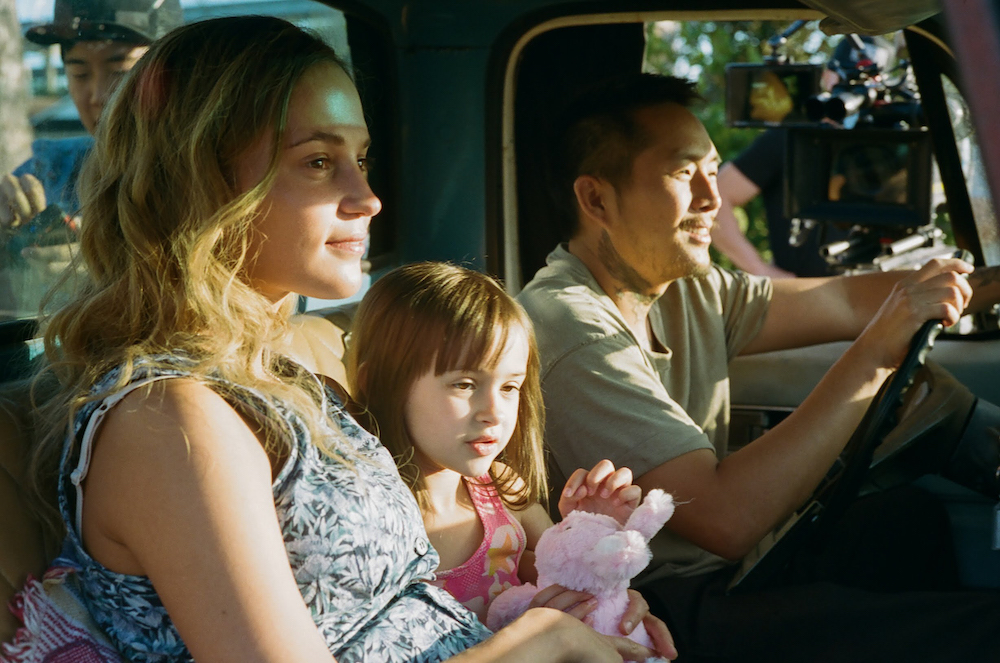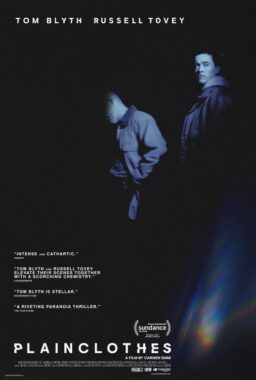Alicia Vikander won an Oscar in 2015 for “The Danish Girl,” but speaks about how “Blue Bayou” came with a certain nervous on-set experience she hasn’t had since her English language debut in 2012’s “Anna Karenina.” In writer/director Justin Chon’s “Blue Bayou,” Vikander sings the song that gives the film its name; casual, tempered, and with a complicated pain behind her stillness. All the while, Vikander’s hands were shaking off-camera, a moment of an actor letting themselves be vulnerable for a story that demands exactly that.
The scene is one of many pieces of raw sentimentality from Chon’s direction, which makes great use of Vikander’s full immersion into many different shades of melancholy. The story of “Blue Bayou” concerns a Korean adoptee (Chon) facing deportation due to outrageous deportation laws, and the problems within their marriage that threaten to tear them apart. They find harmony with Kathy’s daughter (Sydney Kowalske), from a past relationship with a cop (Mark O'Brien). Jessie loves Antonio as much as any child can love a parent; Kathy loves Antonio, and witnesses first-hand the pain of someone being told they do not belong.
Vikander spoke to RogerEbert.com about the making of “Blue Bayou,” the qualities of a good director, the one item that’s always in her bag, and more.
What is the advantage of working with an actor who also is a director, especially when it comes to the intense emotional scenes that are throughout the film?
I think that [Justin Chon], if anyone, has a full understanding of what it is that actors do. And it’s something that a good director does, is to have a language, to be able to communicate very directly with their actors. [Justin] kind of will guide, but he also saw everything not just through a lens, but looking into my eyes and what I was trying to do. He could read off a scene that way, aside from being in it. I think he juggled being both behind and in front of the camera extremely well.
Does that change up the in-scene energy, sharing scenes with your director?
No, I think those things are more down to what kind of film you’re making. All films end up being so different because of the directors and how they rehearse, how they shoot, how well they want to keep to the script. I think due to the nature of the genre and this film, that naturalistic feel that it has, it becomes easily more than that. It’s more open for ad-lib, from both Justin and I. You get better at it, but we just used the script as our main guideline through each scene.
How did you work with Justin and the young Sydney Kowalske to create the family chemistry? What was the key behind it?
It kind of went very fast after I had a chat with Justin that we ended up being prepped. It was a few things, it was a lovely thing how it just end of snowballed. I went out to New Orleans as soon as I could because I had never been there, and I was very happy for a very long time I’ve always wanted to go there. So I went out and just kind of engrossed myself in the culture and meet local people, go out and listen to music, hear different voices, hear people talk. And then also to spend time with Sydney, our daughter. I know this now, but if you work in a film with children, especially with subjects like the ones that are in this film, it’s so important to get to know each other, for them to feel extremely safe. And for them to know what the film’s about, for you to have both profound chats with them and their parents, or to just get time to really hang.
Sydney is incredibly clever, and she understands. I think you need to get her prepped, and you of course handle or choose to … lead the conversation in a certain way. But actually the story is about children and the situation they’ve been put in.

You mentioned earlier about directors having a language, and that makes me wonder how you like to be directed.
Well, it’s funny when I say, “language,” it’s very often that good directors talk very little. It’s true! And what happens is, the best directors I work with is that you give them a take, and obviously sometimes you come prepped, but the beauty and the magic that happens when … it’s amazing, you can do a scene and suddenly when it’s right, everyone, like the boom guy, knows it was the take. Everyone just feels it. And a good director will say, “Ah, Alicia tried something new there,” and when I do it, I feel, “Something happened there. I should have followed that instinct more.” And a good director, I feel, sees that. And you just look at each other, and they look at you and you understand that they saw you were doing something, and they’ll say, “Do it again.” That is magic to me, someone who has that emotional intelligence, and has that eye, and is able to communicate or make a space where the actors get to explore and stretch whatever they have, to dare and accomplish something and not to feel scared. And then sometimes it’s the little things that make you go in a new direction.
Did you have any moments like that during your singing scene in “Blue Bayou”? It seems to require a certain kind of peace, a certain gentle air when filming.
It was good, but I didn’t see too much because I was so nervous. I had a shaking hand in that scene, which I haven’t had since I did my first English speaking day on “Anna Karenina.” And I stood up and I said, “Wow, you’re a professional! And I’m going to have my hand behind my back, and then pretend that I’m fully in control.” I was talking to myself, like Wow, you are really nervous. [laughs] I hadn’t sung in front of people like that. I did when I was a kid, but not as an adult, and not on a film. And also it’s the title of the film, and it became quite a profound scene. It became more than I thought. Because I think that, with Antonio and Kathy in the scene, with everything that just happens, it’s the place they’ve fought to be at, and at this time in the film they have had a very hard time to connect as a couple. And to communicate. And this song kind of becomes a direct way for them to connect, for her to pass on some of the feelings she has for him.
Did you do a lot of rehearsing of the song?
In the shower. And I walked around the kitchen a lot, with my Spotify and Linda Ronstadt singing the song.
Having to also convey a certain emotion on your face, does that help you in the singing? Or does it add more pressure?
I think it goes hand-in-hand. With singing, and music, it’s a very direct tool for emotions, for anyone. If you let yourself go in the film, the world will magically pull you to different instances. And it is a very beautiful but also sad scene for what they go through. In that way, I gave a lot of honor to the song itself. I let myself go, and I let myself be led by the song and the meaning of it.
Have you been inspired by music with other performances, or used music to get into a certain mentality on set?
I travel very light. Two pairs of jeans, two t-shirts, some underwear. I’m a really good small packer. But the one thing that is always in my bag? A boombox. I listen to my lines, I have my accents recorded and listen to it my boombox, and then of course music. It’s everything, it’s Spotify age. But I would say I have a soundtrack on very often. It was Frank Sinatra yesterday.
To read our “Blue Bayou” interview with writer/director/star Justin Chon, click here. “Blue Bayou” will be available in theaters on September 17.












